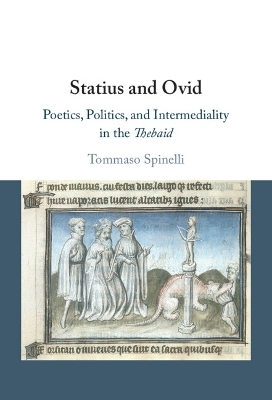
Statius and Ovid
Poetics, Politics, and Intermediality in the Thebaid
Seiten
2024
Cambridge University Press (Verlag)
978-1-009-28221-5 (ISBN)
Cambridge University Press (Verlag)
978-1-009-28221-5 (ISBN)
Moving beyond Virgil-centric readings of Statius' poetry, this book offers an innovative, intermedial, and Ovidian reading of the Thebaid, suggesting that the poem reworks both Virgil and Ovid's politically loaded myths and spatial narratives to scrutinise the new realities of Flavian Rome through the mythical story of Thebes.
This is the first in-depth exploration of the extent and significance of Ovidian intertexts in Statius' Thebaid, with particular emphasis on the interplay between poetics, politics, and material culture. Introducing New Historicist, Cultural Materialistic, and Intermedial approaches to Latin literature, it suggests that, despite their Virgilian patina, Statius' depictions of landscapes, heroes, and gods are pervaded by verbal and semantic allusions to Ovid's mythical narratives. This multi-layered allusivity not only prompts alternative readings of the Augustan classics, but also challenges the reader's perceptions of the Augustanising worldview that the urban landscape of Flavian Rome was arguably meant to convey. The poetic and political significance of Statius' Theban saga thereby moves from critically rewriting the Aeneid to reflecting on the new socio-political issues of Flavian Rome. This title is part of the Flip it Open Programme and may also be available Open Access. Check our website Cambridge Core for details.
This is the first in-depth exploration of the extent and significance of Ovidian intertexts in Statius' Thebaid, with particular emphasis on the interplay between poetics, politics, and material culture. Introducing New Historicist, Cultural Materialistic, and Intermedial approaches to Latin literature, it suggests that, despite their Virgilian patina, Statius' depictions of landscapes, heroes, and gods are pervaded by verbal and semantic allusions to Ovid's mythical narratives. This multi-layered allusivity not only prompts alternative readings of the Augustan classics, but also challenges the reader's perceptions of the Augustanising worldview that the urban landscape of Flavian Rome was arguably meant to convey. The poetic and political significance of Statius' Theban saga thereby moves from critically rewriting the Aeneid to reflecting on the new socio-political issues of Flavian Rome. This title is part of the Flip it Open Programme and may also be available Open Access. Check our website Cambridge Core for details.
TOMMASO SPINELLI is an Honorary Research Fellow in the Department of Classics, Ancient History, Archaeology, and Egyptology at the University of Manchester and works for the UK Government as a Senior Learning Designer based in the Cabinet Office.
Introduction; 1. The post-Ovidian world of The Thebaid; 2. Rewriting the foundational myths of Rome; 3. Forging divinity, conceptualising power; 4. Conclusion; 5. Appendix; 6. Bibliography; Index; Index locorum.
| Erscheinungsdatum | 18.05.2024 |
|---|---|
| Zusatzinfo | Worked examples or Exercises |
| Verlagsort | Cambridge |
| Sprache | englisch |
| Themenwelt | Literatur ► Fantasy / Science Fiction ► Fantasy |
| Literatur ► Historische Romane | |
| Literatur ► Klassiker / Moderne Klassiker | |
| Geschichte ► Allgemeine Geschichte ► Vor- und Frühgeschichte | |
| Geschichte ► Allgemeine Geschichte ► Altertum / Antike | |
| ISBN-10 | 1-009-28221-2 / 1009282212 |
| ISBN-13 | 978-1-009-28221-5 / 9781009282215 |
| Zustand | Neuware |
| Informationen gemäß Produktsicherheitsverordnung (GPSR) | |
| Haben Sie eine Frage zum Produkt? |
Mehr entdecken
aus dem Bereich
aus dem Bereich
Was Pompeji über uns erzählt
Buch | Hardcover (2023)
Propyläen (Verlag)
32,00 €
auf den Spuren der frühen Zivilisationen
Buch | Hardcover (2023)
C.H.Beck (Verlag)
20,00 €


